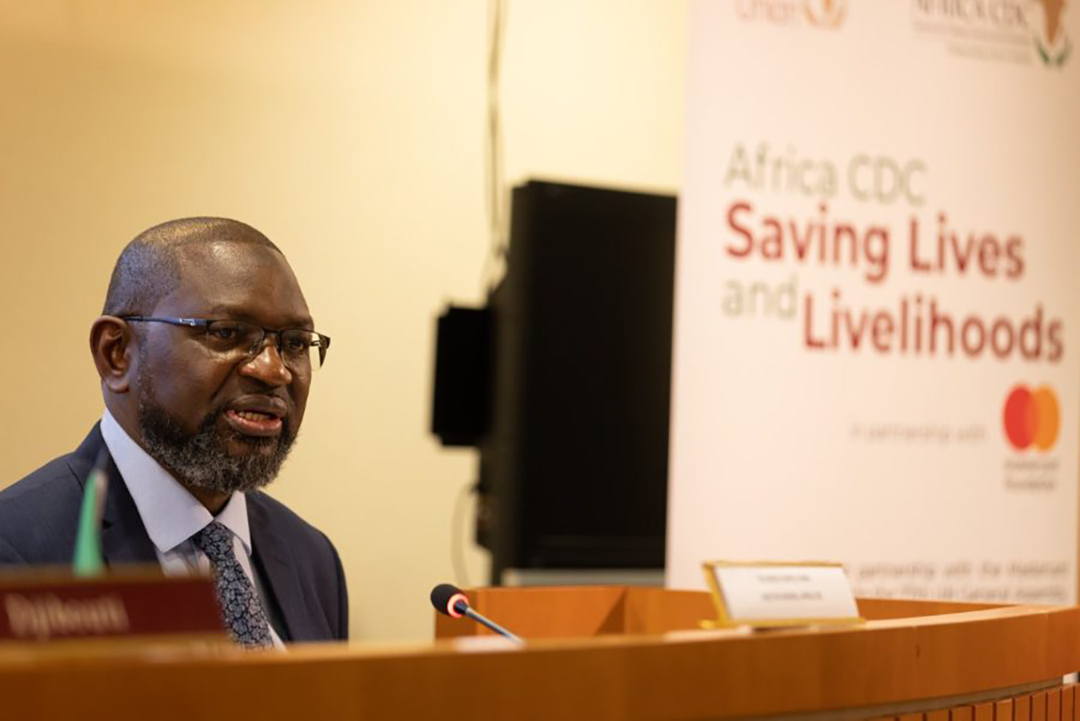ADF STAFF
Months of declining cases of COVID-19 throughout Africa have given rise to a burgeoning sense of optimism among health experts and officials.
But it is a cautious optimism, tempered by nearly two years of hard-won progress.
Dr. Tedros Adhanom Ghebreyesus, director-general of the World Health Organization (WHO), recently offered a positive update on the global pandemic that has killed more than 6 million people.
“We are not there yet, but the end is in sight,” he told reporters during a September 14 virtual news conference.
The acting director of the Africa Centres for Disease Control and Prevention (Africa CDC), however, has a more cautious perspective.
When asked about Tedros’ statement during his own news conference the following day, Dr. Ahmed Ogwell Ouma warned that COVID-19 continues to circulate on the continent, and the virus’s continually mutating strains pose an ongoing threat.
“The pandemic is still very much with us here on the continent,” he said.
African nations have recorded more than 12 million cases of COVID-19 and more than a quarter of a million deaths since the pandemic began, according to Africa CDC statistics through October 1.
South Africa, the hardest-hit country on the continent, has seen case numbers decrease since experiencing a fifth wave of COVID-19 in May and June.
Some countries in North Africa saw a fourth wave come and go in July and August.
But testing numbers have declined as well, and experts note that the lack of recorded cases is a product of the mild illness typically associated with the strains of omicron that currently are dominant.
Dr. Matshidiso Moeti, head of WHO Africa, said early in 2022 that the continent is shifting into a different phase of the COVID-19 pandemic.
“I believe that we are transitioning from the pandemic phase and we will now need to manage the presence of this virus in the long term,” she said in a news briefing.
With more than 1 million worldwide deaths thus far in 2022, however, the pandemic remains an emergency in most countries.
“We expect there to be future waves of infections, potentially at different time points throughout the world caused by different subvariants of omicron or even different variants of concern,” WHO senior epidemiologist Dr. Maria Van Kerkhove said.
While the WHO emphasized that countries maintain adequate medical supplies, equipment and health care workers, Ouma pointed to Africa’s inadequate and overwhelmed health care systems.
He also lamented the relative lack of preventative treatments and therapies, although donations and manufacturing initiatives are on the rise again.
Tedros equated the current phase of the pandemic to the late stages of a marathon.
“Now is the time to run harder and make sure we cross the line and reap the rewards of all our hard work,” he said.
The WHO will convene a meeting of experts in October to decide whether the pandemic is still a public health emergency of international concern.
Throughout the shifting assessments of the pandemic and regardless of optimistic or cautious stances, Ouma has highlighted the role his organization is playing.
“Regional institutions like Africa CDC are the key to successful interventions for health security,” he tweeted on September 23.
Ouma expounded on that topic before the 77th United Nations General Assembly in September.
“If you don’t have strong public health institutions before an emergency, when the emergency comes it doesn’t matter how many resources you have,” he said. “You’ll still struggle.”


Comments are closed.